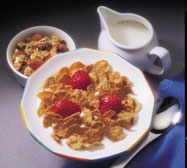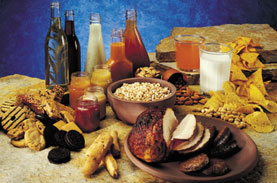
The heat stability of mixed tocopherols means they can be added to cereals during processing.
Mixed tocopherols are resistant to high temperature food processing steps, and have low volatility and good solubility in fats and oils. They have been tested in many applications including baked goods, cereals, dehydrated potatoes, nuts and fried noodles (ramen) and in foods such as meat and egg products and tuna fillets. Their solubility in lipids makes them useful in a variety of fat and oils such as vegetable and fish oils, milkfat, poultry fat and lard, and in food ingredients such as citrus oils or lecithin.
Lisa Davis, development chemist with Cognis, recommends adding the company's Covi-ox® mixed tocopherols into foods as early in the process as possible to guard against oxidation that may develop during manufacturing. “Covi-ox can survive high temperature processing,” says Davis. Also, compared to some plant-derived natural antioxidants, it does not add flavor or odor to foods and so it can be used in applications with mild or delicate flavor profiles.

A broad array of products may realize improved shelflives through the use of natural antioxidants.
For instance, in cereal applications, synthetic agents (e.g., BHTs) are volatile and typically are added after processing rather than into cereals during processing. Covi-ox, however, may be added early in the process to protect the product from oxidation both during and after processing. Covi-ox shows the same functionalities in baked goods. In a study on the use of Covi-ox T-70 in crackers and shortbread, the shelf life of these products more than doubled.
Mixed tocopherols such as Covi-ox are USDA approved as an antioxidant for use in many meat and poultry products. It has GRAS status, and is recognized by the FDA as a preservative according to 21 CFR 182.3890, with no usage level restrictions in non-meats and non-poultry foods (as long as used in accordance with GMP). It is approved for food use in many other countries around the world and has a long track record of safety. It has been on the U.S. market for over 35 years.
In an exciting new development, Cognis has determined that Covi-ox is acceptable for use in organic products. Covi-ox itself is not organic; however, it is allowed for use in “organic” or “made with organic material” products, according to the 95% (7 CFR 205105(c)) and 70% (7CFR 205.301(b) or (c)) rules.
For more information:
Kathleen Moran at 708-579-6191
kathleen.moran@cognis-us.com
www.basf.com